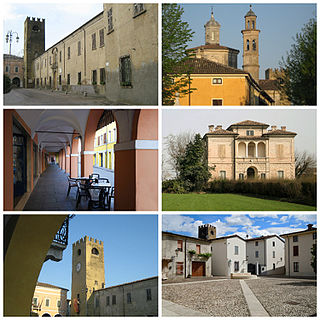
Castel GoffredoItalian pronunciation: [kaˈstɛl ɡofˈfreːdo] is a comune in the province of Mantua, in Lombardy, northern Italy, 35 kilometres (22 mi) from Mantua and a few more from Brescia. It lies in a region of springs at the foot of the slopes that drain into Lake Garda, towards the plain of the Po. Castel Goffredo borders the following municipalities: Castiglione delle Stiviere, Medole, Ceresara, Casaloldo, Asola, Acquafredda, Carpenedolo.

Vincenzo Ι Gonzaga was ruler of the Duchy of Mantua and the Duchy of Montferrat from 1587 to 1612.

Goito is a comune with a population of 10,005 in the Province of Mantua in Lombardy. Goito is 20 kilometres (12 mi) north of Mantua on the road leading to Brescia and Lake Garda, and straddles the old east–west Via Postumia between Cremona and Verona. The town is on the right bank of the Mincio River at a key crossing. The birthplace of Sordello, Goito is part of the historic region known as Alto Mantovano and was the site of a notable fortress.

Volta Mantovana is a comune (municipality) in the Province of Mantua in the Italian region Lombardy, located about 120 kilometres (75 mi) east of Milan and about 20 kilometres (12 mi) northwest of Mantua.

Lorenzo Leonbruno, also known as Lorenzo de Leombeni, was an Italian painter during the early Renaissance period. He was born in Mantua (Mantova), an Italian commune in Lombardy, Italy. Leonbruno is most well known for being commissioned by the court of Francesco Gonzaga, Marquis of Mantua, and his wife Isabella d'Este. The patronage continued with their eldest son Federico II Gonzaga, who was the fifth Marquis of Mantua. Leonbruno was the court painter for the Gonzaga family from 1506–24.

The Diocese of Mantua is a Latin Church ecclesiastical territory or diocese of the Catholic Church in Italy. The diocese existed at the beginning of the 8th century, though the earliest attested bishop is Laiulfus (827). It has been a suffragan of the Archdiocese of Milan since 1819.
Costanzo Antegnati was an organist, organ builder and composer.

The Marquisate or Margraviate of Mantua was a margraviate located in Lombardy, Northern Italy. Placed under the sovereignty of the House of Gonzaga since its erection in 1433, it was further raised to Duchy in 1530.
The following is a timeline of the history of the city of Mantua in the Lombardy region of Italy.

Aloisio Gonzaga was an Italian condottiero.

Palazzo Gonzaga-Acerbi is a historic palace in Castel Goffredo in the Province of Mantua in Italy.

Castel Goffredo Town Hall and Loggia della Magnifica Comunità are located in Piazza Mazzini in Castel Goffredo, in the Province of Mantua (Italy). It is the seat of the municipality.
Events in the history of Castel Goffredo, in Italy.
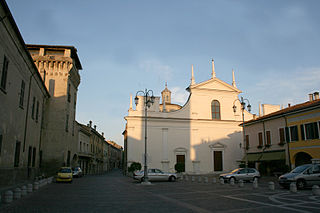
Piazza Mazzini is a public square in the center of Castel Goffredo, region of Lombardy, Italy.

Castelvecchio is the ancient fortified village of Castel Goffredo, in the province of Mantua Lombardy region in Italy, surrounded by walls and a moat. The boundaries currently correspond to the garden of the Palazzo Gonzaga-Acerbi to the north, to vicolo Remoto and vicolo Cannone to the east, to Piazza Mazzini to the south and to piazzetta Castelvecchio and vicolo Castelvecchio to the west.

The Basilika Palatina di Santa Barbara is the Palatine Chapel of the House of Gonzaga in Mantua, Italy.

The Civic Tower is a historic building in the town of Castel Goffredo, in the province of Mantua, Italy.
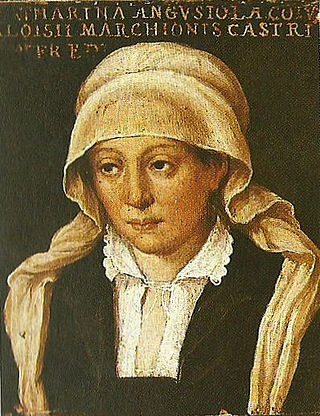
Caterina Anguissola Trivulzio was an Italian noblewoman.
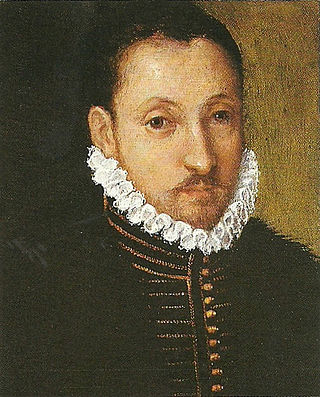
Ferrante or Ferdinando Gonzaga, first marquess of Castiglione was an Italian nobleman and condottiero.
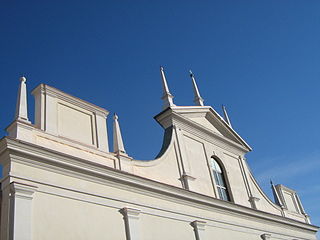
Sant'Erasmo is a Roman Catholic church located in Castel Goffredo, region of Lombardy, Italy.


















